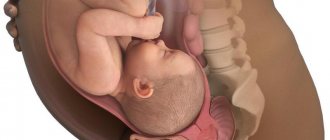Obesity is a disease in which the volume of adipose tissue in the body is significantly increased, and various metabolic disorders occur.
Obesity can be associated both with overeating and a sedentary lifestyle, and with various diseases (in particular, endocrine pathologies, metabolic disorders and central nervous system activity).
According to the World Health Organization, almost a third of residents of economically developed countries are overweight, and, unfortunately, their percentage is constantly growing.
Obesity levels
Depending on how much a person's weight exceeds normal body weight, degrees of obesity are distinguished. First of all, it is necessary to specify what weight is considered ideal. Calculating BMI (body mass index) involves using the following formula: weight in kilograms should be divided by the square of height in centimeters (for example, with parameters of 1.69 m and 65 kg, the formula will look like 65/1.692, which is equal to 22.8). A BMI in the range from 18.5 to 25 is considered normal. However, we are talking about obesity only if the BMI exceeds 30.
- Stage 1 obesity is diagnosed with a BMI from 30 to 34.9
- Stage 2 obesity is diagnosed with a BMI from 35 to 39.9
- Stage 3 is diagnosed with a BMI over 40
Sign up for an appointment with the doctor
Obesity and IVF
IVF and ICSI fertilization.
A woman’s weight affects both the onset of pregnancy and its favorable course. Obesity can become an obstacle to conceiving and bearing a child. Metabolic disorders and hormonal imbalances characteristic of overweight women make it difficult to obtain a positive effect when using assisted reproductive technologies, including in vitro fertilization (IVF), also known as artificial insemination (“in vitro fertilization”).
Both the inability to get pregnant and spontaneous abortion are often associated with significant excess weight and difficulties that accompany therapy aimed at increasing fertility.
If conservative methods of treating infertility (hormone therapy) are unsuccessful, women turn to IVF. But is it possible to expect a positive effect from IVF, which is carried out in conditions of existing metabolic system disorders? Even clinical studies conducted on this topic do not give a clear answer. But they still make it possible to identify categories of women who definitely need to normalize their body weight so that many associated disorders are resolved automatically.
As clinical practice shows, a BMI above 32 has a significant impact on fertility and the successful bearing of a child. For women with this body mass index, gynecologists make it a mandatory requirement to lose weight before they are allowed to resort to the IVF method.
Body mass index table.
Classification
Depending on the causes, primary and secondary obesity are distinguished. Primary obesity is not caused by any pathologies and is detected in approximately ¾ of cases. Secondary obesity develops against the background of some disease.
The android (visceral) type of obesity suggests that fat deposits are distributed predominantly in the abdominal area. The gynoid (feminine) type of obesity suggests that fat deposits are concentrated in the thighs and buttocks. Fat can be deposited fairly evenly throughout the body - in this case they speak of a mixed type of obesity. In order to determine the type of obesity, it is necessary to find out the ratio of waist to hip volume.
In case of female obesity, patients have increased activity of the aromatase enzyme. The decrease in tissue sensitivity to insulin (insulin resistance) in this case is moderately expressed. The level of SHBG (sex hormone binding globulin) is normal.
In visceral obesity, insulin resistance, on the contrary, is significantly expressed. SHBG levels are reduced.
How to lose weight?
As you know, the more weight, the more difficult it is to get rid of it. For the sake of conception, many women exhaust themselves with strict diets or refuse food altogether. Doctors, in turn, reported that the right solution for losing extra pounds would be a balanced diet and physical activity. Experts also offered a list of products that are necessary for successful conception:
• foods rich in carbohydrates: pasta, rice, potatoes, bread;
• foods rich in proteins: poultry, eggs, beans, fish, lentils;
• foods rich in iron: legumes, red meat, green vegetables, pomegranate;
• foods high in vitamin C: fruits, vegetables, freshly squeezed juices;
• fresh fish: tuna, sardine, trout;
• dairy products.
As for prohibited foods, these include cakes, pastries, carbonated drinks and fast food. A woman who is planning to conceive should forget about all foods that contain large amounts of fat and sugar.
Infertility in obese women
Both with primary and secondary obesity in women, there is a dysfunction of the hypothalamus and, as a consequence, disruptions in the activity of the hypothalamic-pituitary-ovarian system. The only difference is that they can either be the cause of this condition, or arise against its background.
Violation of the secretion of sex hormones, thus, according to the feedback principle, can cause disturbances in the regulation of the menstrual cycle on the part of the hypothalamus and pituitary gland.
Obese women often exhibit anovulatory cycles and luteal phase defects. Also, if you are overweight, there is a possibility that the patient will develop polycystic ovary syndrome with subsequent signs of androgenization. Why is this possible? The fact is that the male hormone androstenedinione, produced by the ovaries, is also converted into the female steroid hormone estrone, which in turn causes an increase in the sensitivity of the pituitary gland to the effects of gonadotropin-releasing hormone. In this regard, luteinizing hormone (LH) begins to be produced in the same excess quantities, without the peak release that normally initiates ovulation.
How can excess body weight affect conception?
How does being overweight prevent you from getting pregnant? Numerous medical studies have proven that body weight plays an important role in regulating the normal balance in the body of the expectant mother. It is worth understanding that it is not the weight itself that plays a role, but the quantitative proportion of fat in the body.
So, for example, a girl with broad bones will have a body weight that will fluctuate between 65-70 kg, but most likely, even with short stature, there will be no excess fat in her body. Whereas a girl with an asthenic physique and the same body weight would benefit from losing a few kilograms for the normal functioning of her reproductive system.
Based on clinical studies, doctors found that subcutaneous fatty tissue is essentially a huge endocrine organ, which also produces hormones.
Obesity is a disease caused by improper functioning of the endocrine system. This means that fat in the body begins to be produced from carbohydrates, accumulating in the subcutaneous layer.
Sex hormones and obesity
The maturation of an egg ready for fertilization and the success of its attachment process after conception also occurs under the influence of sex hormones. From this it becomes clear and quite logical that if estrogens and progestogens do not work together, the chances of successful conception are reduced.
You can determine whether excess weight is the reason for the inability to conceive naturally by looking at the existing hormonal imbalance. Under the influence of sex hormones, all processes preceding fertilization of the egg and implantation of the fertilized egg to the wall of the uterus are regulated.
Through hormones, ovulation occurs, the reproductive cell moves through the fallopian tubes, and the full functioning of the corpus luteum and endometrium, the inner layer of the uterus, is ensured.
Hormonal imbalance can negatively affect your ability to conceive. In turn, adipose tissue influences the synthesis of sex hormones. If it is in excess or, conversely, in deficiency, then a hormonal imbalance occurs and ovulation occurs, and, as a result, conception may not take place.
Obesity and infertility
Oddly enough, many doctors associate excess weight and infertility as 2 complementary phenomena. It should be understood that you can talk about infertility only after a year of unsuccessful attempts to get pregnant.
Indeed, very often overweight women cannot conceive a child, which, according to experts, is due to hormonal imbalance that develops against the background of obesity. But it is impossible to say unequivocally that this is precisely the reason for the lack of possibility of full conception. Only through a series of clinical studies can the real cause of infertility be determined.
Risks
It has been proven that women with 2nd and 3rd degree obesity experience disturbances in the menstrual cycle and ovulatory processes. In any case, you can only determine your chances of successful conception with any degree of obesity by undergoing a series of clinical and laboratory examinations.
At the same time, even a slight excess in BW can negatively affect the process of bearing a child, physically exhausting the expectant mother. Not to mention the fact that there may be serious deviations from standard indicators regarding the usefulness of the process of bearing a child.
Pregnancy with excess weight often becomes a high-risk pregnancy:
- high blood pressure;
- swelling;
- phlebeurysm;
- problems in the functioning of the cardiovascular system.
And these are not all the complications that can await an expectant mother during pregnancy with obesity.
Pregnancy with obesity
Expectant mothers who are overweight are at risk for developing certain complications both in the gestational, labor, and postpartum periods.
Overweight women have an increased risk of miscarriage, gestational diabetes mellitus, arterial hypertension, and preeclampsia.
In addition, women who are overweight often experience post-term pregnancy. Also, weakness of labor is often detected, which cannot always be corrected with drugs. In this regard, in many cases, delivery is carried out by cesarean section.
In the postpartum period, bleeding is possible, the cause of which is both disturbances in the hemostatic system and a deterioration in the contractile activity of the uterus.
If you have any questions related to the problem of infertility due to obesity, you can ask them to the doctors at Nova Clinic. You can make an appointment with an endocrinologist by calling the number listed on the website or using the booking button.
Sign up for an appointment with the doctor
Does excess weight prevent you from getting pregnant: how does excess weight affect men and women?
If you are overweight, the increase should not exceed 10 kg. In life, the exact opposite often happens - an already overweight woman gains 15, 20, 25 kilograms.
What this threatens - see above.
How are excess weight and hormones related in women? There are three main hormones that influence weight gain.
Leptin is a regulator of fat content in cells. When the volume of fat in cells decreases, the level of liptin also decreases, which immediately increases appetite and metabolic rate. There is also a reverse process - when there is a lot of fat, leptin tells the brain to stop. But the way we are designed is that with constant overeating, other processes occur in the brain that prevent leptin from stopping the feeling of hunger.
It often causes problems with conception. Many people wonder how excess weight affects the conception of a child in women. Every unnecessary kilogram negatively affects your overall health and is a prerequisite for serious diseases. Extra pounds hinder conception, negatively affecting the menstrual cycle. Excess weight prevents a woman from becoming pregnant because adipose tissue is hormonally active.
Moreover, in healthy people, leptin is a reliable regulator of hunger. Insulin - the pancreas is responsible for its production.
Insulin suppresses the work of enzymes that break down fat, promotes the transformation of excess sugar into fat and, accordingly, the accumulation of fat in cells. When we eat a lot of sweets, insulin levels immediately increase sharply and convert sugar into fat even more actively.
Insulin is responsible for fat storage in all parts of the body. Thyroid hormones.
The thyroid gland is responsible for their production. If these hormones are not enough, hypothyroidism appears, in which fat deposition increases sharply, and a person gains weight strongly and unevenly. There is no need to do this.
View on the map of Chelyabinsk Company photos. Find directions to the Family Medicine Center, JSC, branch in the city. Family Medicine Center, branch in Chelyabinsk. Chelyabinsk Chelyabinsk Magnitogorsk.
We will talk about diets for pregnant women in a separate article, but for now we will give one, the most important advice - remove too fatty, sweet and spicy foods from your diet, focus on natural products - vegetables growing in the ground and fruits growing on trees. Nature has endowed them with everything that expectant mothers need both for saturation and for the normalization of all vital processes.
About the method Treatment of alcohol addiction Treatment of drug addiction Treatment of nicotine addiction Treatment of gambling addiction Treatment of excess weight Treatment of stuttering Treatment of enuresis Treatment of psoriasis, eczema, neurodermatitis. Republic of Belarus Russian Federation.








